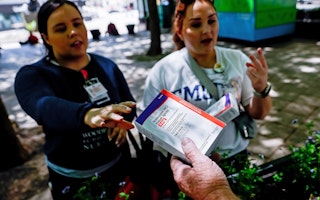Red Cross Weighs in on Drug Criminalization
By Joanne Csete
The International Federation of the Red Cross and Red Crescent Societies (IFRC) is one of the oldest and most eminent global health organizations in the world. IFRC influences the community-level services of millions of health professionals in its local and national chapters and is a respected leader in emergency health services. It was therefore of note that at the recent annual session of the UN Commission on Narcotic Drugs (CND), the IFRC representative spoke not only about the harm reduction work that the organization has long supported but about drug policy more generally.
In particular, the IFRC called on the member states of CND to turn away from criminalization of drug use in their national policies. It is a truly welcome development that an organization of such stature, and with such influence, has joined the call of the global drug policy movement to shift away from punitive law enforcement approaches for people who use drugs.
The following text is excerpted from the statement of IFRC’s Dr. Lasha Goguadze, the senior health officer responsible for Global Harm Reduction and TB Programs, made at CND in Vienna on March 14, 2012:
The level of HIV [prevalence] among people who inject drugs is so high that some countries are edging dangerously close to generalized epidemic. Yet laws and policies continued with failed enforcement tactics.
We often ignore the evidence that to be successful in our drug policies, health services must provide a comprehensive package known as harm reduction programs that combine the measures we have previously mentioned. Instead, the best people who use drugs can hope for is to be driven underground to live with addiction in the dark back streets and abandoned buildings of our towns and cities. Or ever worse, they are criminalized and jailed with little or no regard for their healthcare rights or the impact of this policy on the health of their communities.
…Left unchecked and untreated, drug use constitutes a serious public health concern that can only be addressed through rational public health services that act according to medical science rather than misinformed laws. Evidence points to the effectiveness of humanitarian drug policy. This is worth repeating. Harm reduction works.
This is why the IFRC – the world’s largest humanitarian and development organization, a network of 187 societies of Red Cross or Red Crescent…uniting tens of millions of volunteers half of whom are the youth – strongly call your excellencies to action.
…Treating drug addicts as criminals is destined to fuel the rise of HIV and other infections, not only among those unfortunate enough to have a serious drug addiction, but also for children both into addicted families and ordinary members of the public who are not normally exposed to HIV risks. Injecting drug use is a health issue. It is an issue of human rights. It cannot be condoned, but neither should it be criminalized.
…To conclude, the IFRC, on behalf of the most vulnerable people affected by drug use, strongly calls upon key stakeholders and donors to exert all possible efforts to gather knowledge on the scale of the drug use epidemic at country level and decide on the proper response accordingly. Criminalization, discrimination and stigmatization are not such responses. Laws and prosecutions do not stop people from taking drugs. Neither does the cold turkey methods of detoxification that can be potentially life-threatening. On the contrary, governments should recognize once and for all that a humanitarian drug policy works!
Joanne Csete is a researcher for the Open Society Public Health Program and Global Drug Policy Program.


